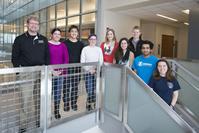BME Co-Ops and Interns: No Longer New Kids on the Block
"It was a tremendous opportunity and risk," Bauer said of his first rotation at Eli Lilly and Co. in May 2009. "It was a learning experience for both parties, so there was a chance that the co-op could be a flop."
But, it wasn’t. Instead it became the first of many co-op success stories coming out of the Weldon School. Bauer was tasked with a leadership role on a project as it moved through several stages. “I was able to lead research on mechanical responses of skin in relation to injection methods. This started out in the lab and progressed to me actually conducting a market research study, followed by a clinical study to prove my results. It was a unique opportunity.” The scope and responsibility of the co-op enabled Bauer to demonstrate a broad range of knowledge and abilities, and gave both Bauer and Lilly time to decide if they were a good match. They were. Bauer was offered a job with Lilly, and he is still there working as a development engineer.
Since Bauer and Lilly established that first Weldon School co-op, the co-op and internship program has enjoyed tremendous growth and success. Jeremy Hale, associate director of undergraduate programs, cited a growing awareness of biomedical engineers as one factor that has contributed to the explosion of companies wanting them for co-ops and internships. “More people are learning about biomedical engineers and what they can do.” said Hale. “Companies are very curious about how they can fit BMEs into their company culture and R&D process. They are learning that BMEs are multidisciplinary and that you can move them around and they do very well.”
Rob Schottelkotte (BSBME 2010), an R&D engineer at Procter & Gamble, experienced this evolution firsthand. “Early on in my career (as an intern/co-op at a few places), I felt like I had to validate and prove the value of the BME degree. At some point, I think one has to recognize that a BS degree in any engineering discipline is only a start. It is also important to recognize that a BS degree is typically a sign of great engineering breadth. For any student looking to start at a company that doesn’t traditionally hire a BME, the breadth of technical understanding is much more valuable than depth in an area that is not core to the company’s product portfolio.”
Schottelkotte is an example of a biomedical engineer thriving where they are relatively new to the scene. “In many cases, BME students bring a new skill set and brand of thinking to the table,” Schottelkotte stated. “This makes them highly attractive because they can bring new attitudes and perspectives that can reinvigorate the R&D process. At P&G, we focus our recruiting process on identifying and hiring the person and not the position. This model for hiring has served us well as far as leadership development and R&D culture are concerned.”
Co-Options
In addition to the traditional model of three-semester co-ops that rotate study and work sessions, a six-month continuous option and a one-year continuous option are now available to Weldon School co-ops. Hale has been spearheading the development of these opportunities, and said they are welcome options for some students and companies. “Students can get deeper into projects,” Hale said citing the advantages of a six-month or one-year co-op. “They can take on multiple projects, which is more reflective of a typical job. And it’s easier on students not to have to move back and forth so many times.”
Eric Miller, a Weldon School junior, recently completed the first year-long co-op with MED Institute from August 2012 to August 2013, and said he enjoyed the experience greatly. “I was able to work on longer projects, and more ongoing projects,” Miller said. “Another aspect that I enjoyed was being able to act as a liaison to the co-ops that came back [to MED Institute] in the spring and summer to inform them on everything that was going on so that they could acclimate back in to the team more easily. For the company, it was beneficial for me to be there an entire year because they would not have to spend time training new co-op students to know how to do some of the testing we performed there as well as waste time transitioning projects between co-ops.”
Any co-op, regardless the duration, is not without its pains. It can be difficult for students to transition back to classes when the co-op ends. It can be discouraging to be off sync with the class students entered with and where they had the most friends. In the end, most co-ops seem to agree on one thing: it’s worth it. “If you want to work in industry,” Bauer said, “it’s a sure way to get ahead of the curve.”
Co-Op Stats for Purdue College of Engineering*:
75% of co-ops stay with their co-op employer
10% of co-ops received full-time offers without interviewing
56% of co-ops interviewed with their employers
89% received an offer after their interview
88% accepted their full-time offers
*Data from a survey conducted in summer 2012.
The Weldon School has a growing list of companies that offer co-ops and internships to Weldon students, and is always welcoming more. Here are just a few of our partners:
Eli Lilly (first Weldon School co-op partner)
Abbott Labs
Accenture
Agilent (New!)
Akina
Biomet
Cook Biotech
Cook Medical
Cook Pharmica
Cyberonics
DePuy
Edwards Lifesciences (New!)
Ethicon EndoSurgery
Fort Wayne Metals
Helmer Scientific (New!)
Hollister
Jackson Laboratories (New!)
Kimberly-Clark (New!)
MED Institute
Medtronic (New!)
Methodist Hospital Research Institute (New!)
Nexxt Spine (New!)
Procter & Gamble (New!)
Roche (New!)
Spectranetics (New!)
St. Jude Medical
Symmetry Medical (New!)
Tornier (New!)
Trimedx/Medxcel (New!)
Zimmer
Purdue alumni and industry managers: feel free to call Jeremy Hale about opportunities in your company or to create a partnership with the Weldon School of Biomedical Engineering. You may contact Jeremy Hale at (765) 494-7871 or hale2@purdue.edu


